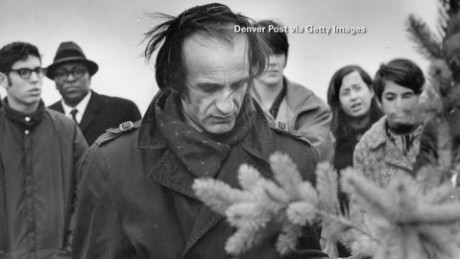(CNN)Here is a look at the life of Holocaust survivor and author Elie Wiesel.
Personal
Birth date: September 30, 1928
Death date: July 2, 2016
Birth place: Sighet, Transylvania (now Romania)
Birth name: Eliezer Wiesel
Father: Shlomo Wiesel, a grocer
Mother: Sarah (Feig) Wiesel
Marriage: Marion (Rose) Wiesel, (1969-July 2, 2016, his death)
Children: Shlomo Elisha, 1972
Education: Attended the Sorbonne, 1948-1951
Other Facts
Was a human rights advocate, speaking out about Bosnian ethnic cleansing, Cambodian refugees, and South African apartheid.
Wiesel's mother and youngest sister died at Auschwitz. His two older sisters survived.
While in a French orphanage, Wiesel's picture was taken by a journalist who came to visit. One of his sisters saw the picture in the paper and they were reunited. Later he was reunited with his other sister.
Wiesel appeared in a famous photograph taken at Buchenwald of male prisoners in bunk beds.
Early in his career, Wiesel wrote for French newspaper L'Arche, Tel Aviv newspaper Yedioth Ahronoth, and New York City newspaper Jewish Daily Forward.
Lost his life savings in Bernard Madoff's Ponzi scheme. His foundation also lost millions.
Timeline
1944 - The Wiesel family is sent to the Auschwitz concentration camp, when Elie is 15.
January 1945 - Is moved with his father to the Buchenwald concentration camp. His father dies there.
April 11, 1945 - The Buchenwald concentration camp is liberated. Wiesel and other orphans are sent to France.
1958 - Wiesel's book, "La Nuit," is published. It is the story of the Wiesel family being sent to the Nazi concentration camps.
1960 - "Night," the English translation of "La Nuit," is released.
1963 - Becomes an American citizen.
1972-1976 - Distinguished Professor of Judaic Studies at the City University of New York.
1976 - Named the Andrew Mellon Professor in the Humanities at Boston University.
1978 - Is appointed chairman of the President's Commission on the Holocaust by President Jimmy Carter.
1980 - Becomes the founding chairman of the U.S. Holocaust Memorial Council.
1982-1983 - Henry Luce Visiting Scholar in Humanities and Social Thought at Yale University
April 19,1985 - President Ronald Reagan presents Wiesel with the Congressional Gold Medal.
1986 - Wins the Nobel Peace Prize.
1987 - Establishes The Elie Wiesel Foundation for Humanity.
2006 - Is awarded an honorary knighthood from the British Empire.
February 1, 2007 - Holocaust denier Eric Hunt attacks Wiesel and tries to drag him into a room at the Argent Hotel in San Francisco. Wiesel is not injured. A few days later, Hunt posts an account of the attack on an antisemitic website, saying he planned to force Wiesel to admit the Holocaust never happened.
July 21, 2008 - Hunt is found guilty of a felony hate crime for his attack of Wiesel. At his sentencing in August, Hunt is sentenced to two years in prison and four years on parole. He is also ordered to get mental health treatment.
February 25, 2010 - President Obama presents Wiesel with a National Humanities Medal.
June 2011 - Undergoes open heart surgery.
December 2012 - Wiesel's memoir "Open Heart" is released in the United States.
July 2, 2016 - Wiesel dies at the age of 87.









